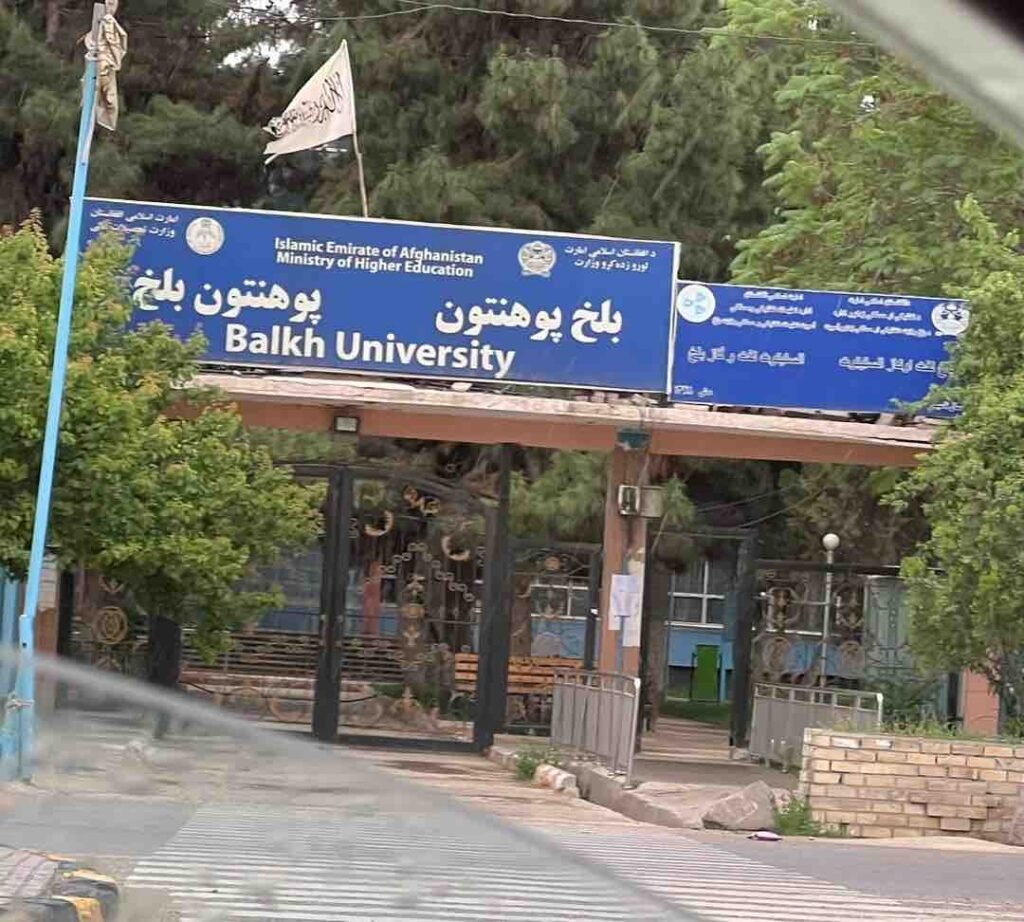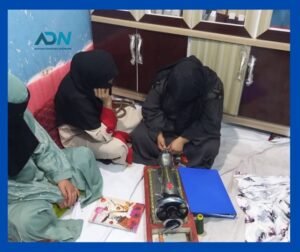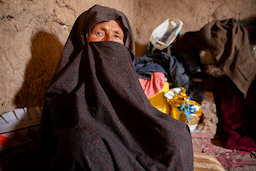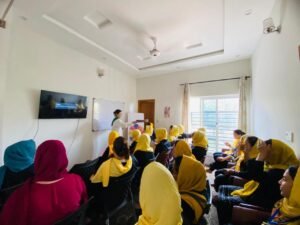Silent Dreams: The Story of an Afghan Educator in Taliban-Ruled Afghanistan

University of Balkh, northern Afghanistan. Photo by @Hadia
The following article was written by Hadia* as part of VIDC’s “Life under the Taliban” series, in which women and men from different parts of the country and with different perspectives and experiences tell their stories of how, despite all the difficulties, they have not lost hope for a better future. Hadia was a lecturer at a private university in Balkh Province, Afghanistan, before she lost her job and source of income after the Taliban took power.
My Story
I have always strived to stand on my own two feet and be a support to my father. I was dedicated to this goal for eight years until the Taliban took over three years ago. We then found ourselves in a difficult time. Every day brought new decrees that deeply affected our lives, but we persevered to ensure that the girls were not forced to give up their ambitions to study and work.
The Taliban consistently sent letters and notices to the university, threatening the termination of female students and employees who did not comply with their rules. These rules mandated the wearing of burqas and loose black clothing. We were required to wear a burqa when teaching and when sitting in our offices, even in women-only office areas. Before long, the Taliban hastily revealed their sinister intention, and for the last eighteen months, they have barred all girls, even those wearing traditional black clothes, from entering universities and schools beyond the sixth grade.
On 22 December 2022, all universities were set a critical deadline, and the Taliban announced that universities were no longer permitted to admit girls, be they employees or students. As an instructor at the university, I was personally affected by these restrictions, which cost me my job and shattered the dreams of countless Afghan girls and women seeking education.
A Woman’s Story of Loss, Hope and Renewal
As Afghan women, we held onto the hope of one day returning to our duties. Indeed, my position at the university was not merely a job but a duty I was willing to fulfil, despite having to endure the imposed restrictions. Day by day, this situation took a toll on me, plunging me into depression.
I used to be a pillar of support for my family, contributing to household expenses alongside my father. As the eldest child of my parents, I bore a share of the family’s responsibilities. When the Taliban government seized power in August 2021, my father lost his job with a construction company. My eventual job loss placed further financial burdens on my family. Now, my younger brother, just twenty-four years old, has taken on the responsibility of paying for household expenses. He is currently the sole worker among my siblings, who are all navigating the challenges that unfolded with the change in government more than two years ago. Working in a restaurant was the only job my brother could find.
Looking at my family, unable to contribute to household expenses as I had before, I felt helpless. Despite their assurances, I tried not to show my distress, unwilling to burden them with my problems. My father attempted to distract me from negative thoughts but was not successful. In an attempt to lift my spirits, my family and I moved to Kabul under the pretext of obtaining a passport, hoping a change of scenery would improve my health. After a year of considerable effort, I managed to obtain my passport and the hope that one day it might offer an opportunity to escape this metaphorical prison—a beacon of hope that led nowhere.
I had visited Kabul many times before. During those visits, I enjoyed the freedom to explore, but it was different this time. The Taliban’s stringent restrictions on women prohibited us from accessing recreational places, moving freely around the city and even visiting the open markets. In essence, my family left one form of confinement in the north only to suffer another in the capital.
Bearing the Burden: Afghan Women’s Ordeal
For two and a half years, the Taliban’s rule serves as a stark demonstration of the serious threat that this government’s continued rule poses to Afghan society and the dreams of Afghanistan’s people. Despite the jeopardisation of our society and attempts to crush our dreams, the magnitude of the threat we – Afghan women – pose to the Taliban government is evident in their deliberate disregard for our abilities and relentless efforts to harm girls in every possible way. We feel metaphorically buried alive, along with all our aspirations, by the systematic dismantling of the dreams of an entire generation of Afghan girls.
This is our government – an entity that fears the influence of girls and dreads the potential impact that girls and women might have on the regime’s stability. As women have the right to life, education, financial independence and social equality, their presence in society deserves recognition, the preservation of their identity and the acknowledgment of their human value and respect. By suppressing and limiting the potential of Afghan women and girls, the Taliban’s rule casts a dark shadow over everyone and affects men and women alike. This distressing reality persists.
As I close my eyes, thousands of questions flood my mind, yet I find no convincing answers and must settle for the stark realisation that my sin is simply that I was born a girl. In the blink of an eye, all my dreams have dissipated, and everything unfolds like a fleeting dream.
Two and a half years have elapsed since the dreams of millions of young individuals, particularly Afghan girls and women, were shattered. The ruins of these dreams, which only we Afghan women can comprehend, remain a witness to our survival in this turbulent country. As Afghan women, all we can do is wish for an end to this situation. My dreams have turned into nightmares, and the many losses have left me feeling depressed. I remain physically alive, but my spirit has been crushed. It has been more than a year since I lost my job and it is still tough to adjust to this new reality.
Finding Hope Amid Despair
Lately, I have heard distressing news about several girls resorting to suicide. The sole reason for these tragic decisions was the denial of their right to study and work outside their homes. In addition to limiting access to schools and universities for girls and women, the Taliban shut down industries that employed women, even beauty salons, leaving women with no employment opportunities. The loss of the right to work caused by these closures left many in despair. Reports circulating on social media hint at disturbing trends, including rumours of girls being abducted from the streets of Mazar-e Sharif by the Taliban and taken to unknown locations for not adhering to strict dress codes.
Today, the Taliban uses violence, including torture, murder and assassination, to suppress the voices of freedom and justice. Based on two and a half years under their rule, it is clear that the Taliban’s continued grasp on power is a risk to the country’s future. That women have no presence and no future under the Taliban will undoubtedly cause harm to society and continue to destroy my dreams and those of millions of Afghan women.
Over the past few years, I have found myself isolated, opting to be alone and not wanting to burden my parents. I keep my interactions with friends minimal. Despite my inclination towards solitude, my friends have stood by me, encouraging me not to succumb to challenges and supporting me through the ups and downs of life. Now, I am determined to rise stronger than before and will persist in my efforts.
Currently, I occupy myself by learning tailoring in the hope that it will bring a positive change to my mood and teach me new skills. The loss of my happiness and enthusiasm has been overwhelming, but each stitch I make brings some improvement, serving as small beacons of hope in my life, especially during a time when the doors to women’s progress have been closed. Despite the Taliban’s suppression, we are resilient, refuse to accept defeat and will emerge stronger than before.
With unwavering hope, I look forward to the day this nightmare ends and a new era of opportunities begins, a day when universities and schools once again open their doors to all girls and women when our passions for work and education are reignited. I eagerly await the dawn of that day, when I will joyfully resume my duties alongside millions of Afghan girls and women.
This article was initially published by the VIDC website.
Author: Hadia* was a lecturer at a private university in Balkh Province, Afghanistan. She received her bachelor’s degree in law and political science from Taj Private University in 2014. After graduation, she worked at a private university in Mazar-e Sharif, the capital of the northern province of Balkh, where she taught law and political science for eight years.
Note: The contents of the article are of sole responsibility of the author. Afghan Diaspora Network will not be responsible for any inaccurate or incorrect statement in the articles.










